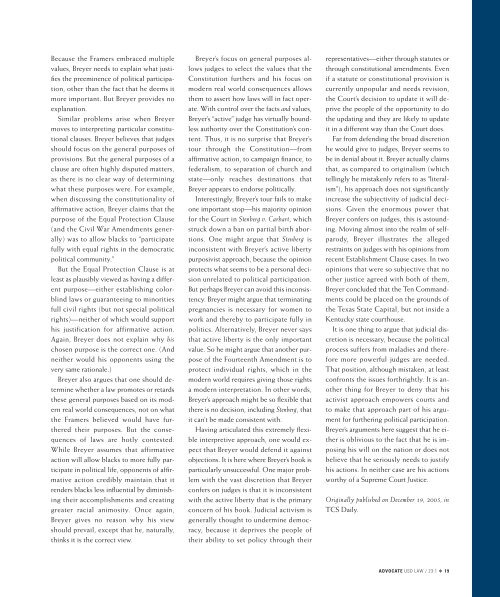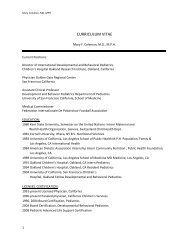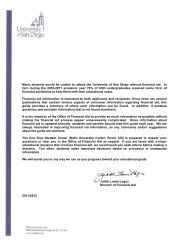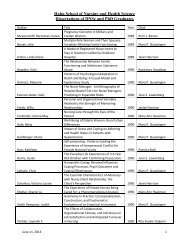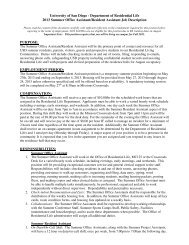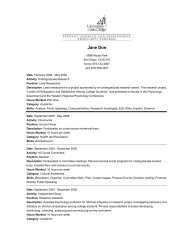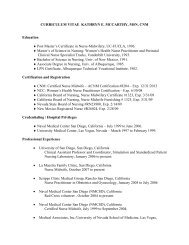Kevin Cole - University of San Diego
Kevin Cole - University of San Diego
Kevin Cole - University of San Diego
Create successful ePaper yourself
Turn your PDF publications into a flip-book with our unique Google optimized e-Paper software.
Because the Framers embraced multiple<br />
values, Breyer needs to explain what justifies<br />
the preeminence <strong>of</strong> political participation,<br />
other than the fact that he deems it<br />
more important. But Breyer provides no<br />
explanation.<br />
Similar problems arise when Breyer<br />
moves to interpreting particular constitutional<br />
clauses. Breyer believes that judges<br />
should focus on the general purposes <strong>of</strong><br />
provisions. But the general purposes <strong>of</strong> a<br />
clause are <strong>of</strong>ten highly disputed matters,<br />
as there is no clear way <strong>of</strong> determining<br />
what these purposes were. For example,<br />
when discussing the constitutionality <strong>of</strong><br />
affirmative action, Breyer claims that the<br />
purpose <strong>of</strong> the Equal Protection Clause<br />
(and the Civil War Amendments generally)<br />
was to allow blacks to “participate<br />
fully with equal rights in the democratic<br />
political community.”<br />
But the Equal Protection Clause is at<br />
least as plausibly viewed as having a different<br />
purpose—either establishing colorblind<br />
laws or guaranteeing to minorities<br />
full civil rights (but not special political<br />
rights)—neither <strong>of</strong> which would support<br />
his justification for affirmative action.<br />
Again, Breyer does not explain why his<br />
chosen purpose is the correct one. (And<br />
neither would his opponents using the<br />
very same rationale.)<br />
Breyer also argues that one should determine<br />
whether a law promotes or retards<br />
these general purposes based on its modern<br />
real world consequences, not on what<br />
the Framers believed would have furthered<br />
their purposes. But the consequences<br />
<strong>of</strong> laws are hotly contested.<br />
While Breyer assumes that affirmative<br />
action will allow blacks to more fully participate<br />
in political life, opponents <strong>of</strong> affirmative<br />
action credibly maintain that it<br />
renders blacks less influential by diminishing<br />
their accomplishments and creating<br />
greater racial animosity. Once again,<br />
Breyer gives no reason why his view<br />
should prevail, except that he, naturally,<br />
thinks it is the correct view.<br />
Breyer’s focus on general purposes allows<br />
judges to select the values that the<br />
Constitution furthers and his focus on<br />
modern real world consequences allows<br />
them to assert how laws will in fact operate.<br />
With control over the facts and values,<br />
Breyer’s “active” judge has virtually boundless<br />
authority over the Constitution’s content.<br />
Thus, it is no surprise that Breyer’s<br />
tour through the Constitution—from<br />
affirmative action, to campaign finance, to<br />
federalism, to separation <strong>of</strong> church and<br />
state—only reaches destinations that<br />
Breyer appears to endorse politically.<br />
Interestingly, Breyer’s tour fails to make<br />
one important stop—his majority opinion<br />
for the Court in Stenberg v. Carhart, which<br />
struck down a ban on partial birth abortions.<br />
One might argue that Stenberg is<br />
inconsistent with Breyer’s active liberty<br />
purposivist approach, because the opinion<br />
protects what seems to be a personal decision<br />
unrelated to political participation.<br />
But perhaps Breyer can avoid this inconsistency.<br />
Breyer might argue that terminating<br />
pregnancies is necessary for women to<br />
work and thereby to participate fully in<br />
politics. Alternatively, Breyer never says<br />
that active liberty is the only important<br />
value. So he might argue that another purpose<br />
<strong>of</strong> the Fourteenth Amendment is to<br />
protect individual rights, which in the<br />
modern world requires giving those rights<br />
a modern interpretation. In other words,<br />
Breyer’s approach might be so flexible that<br />
there is no decision, including Stenberg, that<br />
it can’t be made consistent with.<br />
Having articulated this extremely flexible<br />
interpretive approach, one would expect<br />
that Breyer would defend it against<br />
objections. It is here where Breyer’s book is<br />
particularly unsuccessful. One major problem<br />
with the vast discretion that Breyer<br />
confers on judges is that it is inconsistent<br />
with the active liberty that is the primary<br />
concern <strong>of</strong> his book. Judicial activism is<br />
generally thought to undermine democracy,<br />
because it deprives the people <strong>of</strong><br />
their ability to set policy through their<br />
representatives—either through statutes or<br />
through constitutional amendments. Even<br />
if a statute or constitutional provision is<br />
currently unpopular and needs revision,<br />
the Court’s decision to update it will deprive<br />
the people <strong>of</strong> the opportunity to do<br />
the updating and they are likely to update<br />
it in a different way than the Court does.<br />
Far from defending the broad discretion<br />
he would give to judges, Breyer seems to<br />
be in denial about it. Breyer actually claims<br />
that, as compared to originalism (which<br />
tellingly he mistakenly refers to as “literalism”),<br />
his approach does not significantly<br />
increase the subjectivity <strong>of</strong> judicial decisions.<br />
Given the enormous power that<br />
Breyer confers on judges, this is astounding.<br />
Moving almost into the realm <strong>of</strong> selfparody,<br />
Breyer illustrates the alleged<br />
restraints on judges with his opinions from<br />
recent Establishment Clause cases. In two<br />
opinions that were so subjective that no<br />
other justice agreed with both <strong>of</strong> them,<br />
Breyer concluded that the Ten Commandments<br />
could be placed on the grounds <strong>of</strong><br />
the Texas State Capital, but not inside a<br />
Kentucky state courthouse.<br />
It is one thing to argue that judicial discretion<br />
is necessary, because the political<br />
process suffers from maladies and therefore<br />
more powerful judges are needed.<br />
That position, although mistaken, at least<br />
confronts the issues forthrightly. It is another<br />
thing for Breyer to deny that his<br />
activist approach empowers courts and<br />
to make that approach part <strong>of</strong> his argument<br />
for furthering political participation.<br />
Breyer’s arguments here suggest that he either<br />
is oblivious to the fact that he is imposing<br />
his will on the nation or does not<br />
believe that he seriously needs to justify<br />
his actions. In neither case are his actions<br />
worthy <strong>of</strong> a Supreme Court Justice.<br />
Originally published on December 19, 2005, in<br />
TCS Daily.<br />
ADVOCATE USD LAW / 23:1 ❖ 19


